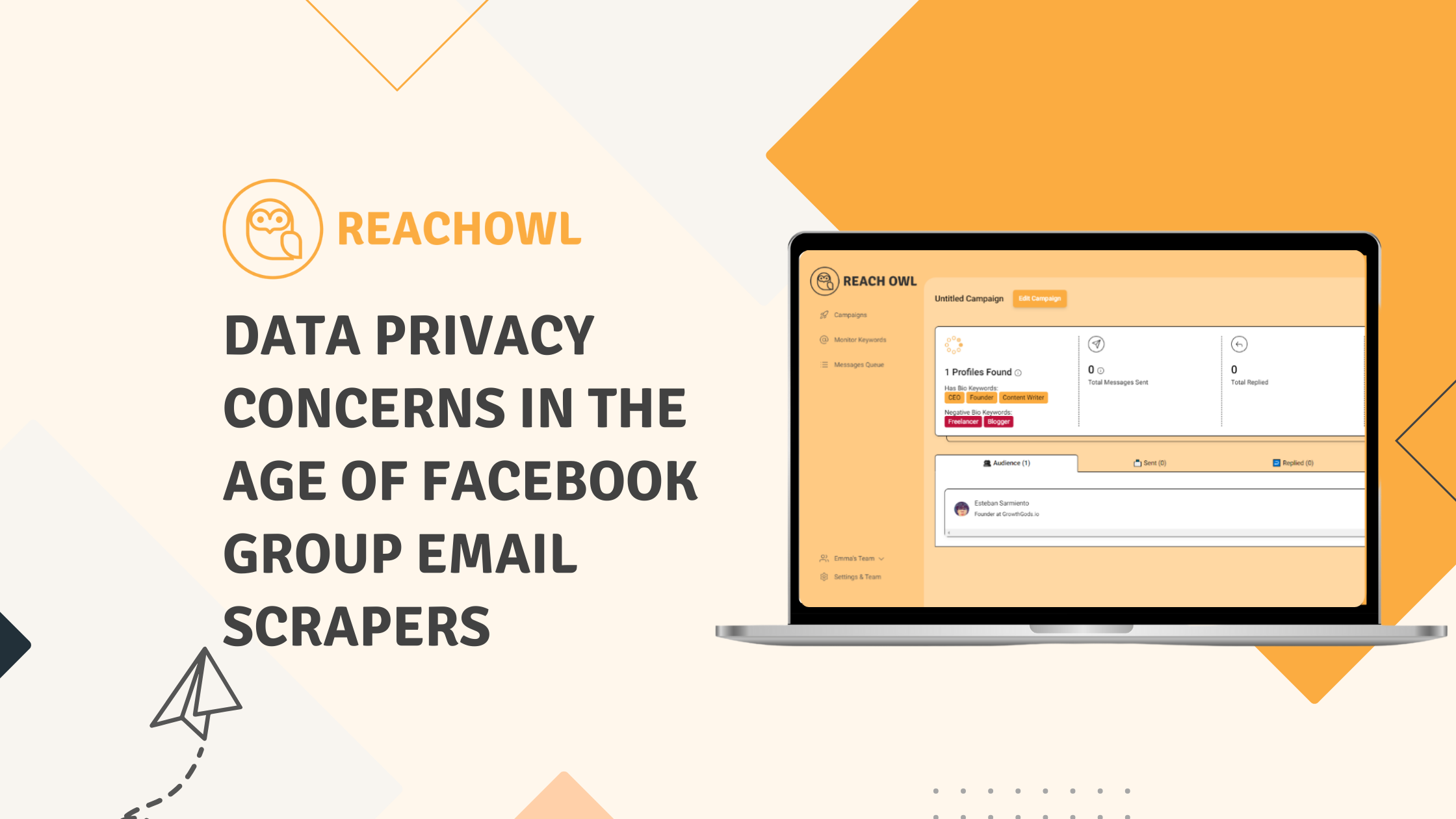There has been a concerning trend of Facebook group email scraping, where individuals or organizations extract email addresses from Facebook groups without the explicit consent of group members. This practice has raised significant ethical and legal questions regarding data privacy, consent, and the responsible use of online platforms.
This blog post explores the data privacy concerns associated with this practice, delving into the implications for individuals, businesses, and the broader online community.
Table of Contents
ToggleFacebook’s Stance on Email Scraping
Facebook, as a platform, has clear policies and terms of service that explicitly prohibit scraping of its content, including email addresses. Violating these terms can result in the suspension or termination of user accounts. Additionally, Facebook has taken legal action against individuals and entities engaged in scraping activities, demonstrating a commitment to protecting user data.
Data Privacy Implications
The data privacy implications of email scraping from Facebook groups are multifaceted and significant.
Here are some of the key concerns:
1. Unauthorized Data Collection:
Email scraping from Facebook groups without permission is like stealing personal information. Members of these groups don’t usually think others will take their emails and use them for other things. Doing this breaks their trust and privacy.
2. Informed Consent:
When people share their emails in a Facebook group, they usually think it’s only for that group. They don’t expect others to take their emails and use them for different things. If that happens without asking, it can hurt trust and make people feel like their privacy is being invaded.
3. Misuse of Data:
The emails taken from scraping are sometimes used for things like ads, spam, or even bad stuff like trying to trick people into giving away their information. Using these emails the wrong way can lead to really bad things like stealing identities, scams, and messing with people’s privacy.
4. Eroding Trust:
When people think their information might be taken and misused, it can make them not trust online groups like those on Facebook. They might stop talking or sharing helpful things, which makes these groups less fun and useful for everyone.
5. Data Protection Laws:
Data protection laws, such as the European Union’s General Data Protection Regulation (GDPR), are designed to safeguard individuals’ personal data. Scraping email addresses without consent or a legitimate basis for processing may violate these laws, potentially resulting in legal consequences and fines for the data collector.
6. Impact on Vulnerable Populations:
Email scraping practices can disproportionately impact vulnerable populations, including the elderly and individuals who are less technologically savvy. They might not know how to protect themselves and could be tricked or have their privacy invaded by bad people.
Legal Frameworks for Data Privacy
To address data privacy concerns associated with email scraping, various legal frameworks and regulations have been enacted worldwide.
Here are a few notable ones:
1. General Data Protection Regulation (GDPR):
The GDPR, enforced in the European Union, sets stringent standards for data protection. It requires organizations to obtain explicit consent for data processing, ensure data security, and provide individuals with the right to access and control their data all of which can be supported by robust measures like dedicated server.
2. California Consumer Privacy Act (CCPA):
The CCPA, in effect in California, grants consumers the right to know what personal information is being collected about them and the right to request the deletion of that information. It also imposes obligations on businesses regarding data transparency and security.
3. CAN-SPAM Act:
The CAN-SPAM Act in the United States regulates commercial email messages. It requires that email marketers provide opt-out mechanisms, include accurate header information, and refrain from deceptive subject lines.
4. Data Protection Authorities:
Many countries have data protection authorities responsible for enforcing data privacy regulations. These authorities can investigate data breaches and impose fines for non-compliance.
Reduce Data Privacy Concerns
To reduce data privacy concerns related to email scraping from Facebook groups, several measures can be taken:
1. User Education:
Facebook group members should be educated about the risks associated with sharing personal information, including email addresses, in public forums. They should be encouraged to exercise caution and be mindful of privacy settings.
2. Enhanced Platform Security:
Social media platforms like Facebook can enhance their security measures to detect and prevent email scraping activities. Implementing CAPTCHAs, rate limiting, and other security mechanisms can help deter scrapers.
3. Reporting Mechanisms:
Platforms can provide users with easy-to-use reporting mechanisms for suspicious activities, including scraping. Timely reporting can help platforms take action against malicious actors.
4. Legal Action:
Individuals and organizations affected by email scraping can explore legal options for recourse. This may include pursuing civil actions against scrapers under relevant data protection laws. For example, recent discussions on the role of social media in serious issues like sexual grooming, as highlighted by Cifarelli Law’s article, emphasize the importance of legal action in protecting vulnerable individuals from online exploitation.
5. Data Protection Impact Assessments (DPIAs):
Organizations that collect and process personal data should conduct DPIAs to assess and mitigate risks to data subjects. This can help identify and address potential privacy concerns.
Conclusion
Data privacy is an ongoing engagement that requires collective effort and attention. Facebook group email scraping serves as a reminder of the challenges. By recognizing the importance of data privacy, adhering to responsible data practices, and advocating for stronger regulations, we can ensure a safer and more secure digital future for all.

